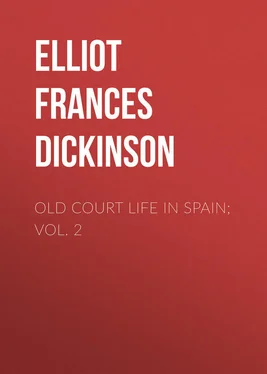Frances Elliot - Old Court Life in Spain; vol. 2
Здесь есть возможность читать онлайн «Frances Elliot - Old Court Life in Spain; vol. 2» — ознакомительный отрывок электронной книги совершенно бесплатно, а после прочтения отрывка купить полную версию. В некоторых случаях можно слушать аудио, скачать через торрент в формате fb2 и присутствует краткое содержание. Жанр: foreign_antique, foreign_prose, на английском языке. Описание произведения, (предисловие) а так же отзывы посетителей доступны на портале библиотеки ЛибКат.
- Название:Old Court Life in Spain; vol. 2
- Автор:
- Жанр:
- Год:неизвестен
- ISBN:нет данных
- Рейтинг книги:3 / 5. Голосов: 1
-
Избранное:Добавить в избранное
- Отзывы:
-
Ваша оценка:
- 60
- 1
- 2
- 3
- 4
- 5
Old Court Life in Spain; vol. 2: краткое содержание, описание и аннотация
Предлагаем к чтению аннотацию, описание, краткое содержание или предисловие (зависит от того, что написал сам автор книги «Old Court Life in Spain; vol. 2»). Если вы не нашли необходимую информацию о книге — напишите в комментариях, мы постараемся отыскать её.
Old Court Life in Spain; vol. 2 — читать онлайн ознакомительный отрывок
Ниже представлен текст книги, разбитый по страницам. Система сохранения места последней прочитанной страницы, позволяет с удобством читать онлайн бесплатно книгу «Old Court Life in Spain; vol. 2», без необходимости каждый раз заново искать на чём Вы остановились. Поставьте закладку, и сможете в любой момент перейти на страницу, на которой закончили чтение.
Интервал:
Закладка:
In the tumult of his soul, Emanuel forgot the presence of the king, the crowd, the occasion, all but his passion of vengeance.
“And if the crime was so public,” asks the king, whose attention has deepened as he proceeded, “and your father talked so loud that he was stabbed for it, what punishment did the archbishop and the chapter impose on the canon?”
“His punishment!” cries Emanuel. “Ha! that is just it. His punishment! Por Dios! ” – and such a volley of words comes he can scarcely articulate – “The chapter! Yes, the chapter held a court in the sacristy with closed doors, the villains! and condemned him not to say Mass for one year !!”
“Then,” cries Don Pedro, in his harsh voice and a bitter smile on his face, for the young man’s courage pleases him, and his honest eyes, “I condemn you, Emanuel el zapatero , to pass one year without making shoes.”
A loud shout of applause rises from the pobres . Those near the steps of the cathedral repeat it to others farther off, the people in the streets shout it to those at the windows, and these to the crowds pressed on the terrace-roofs, so that the king’s justice is known to all.
“Yes, my lord archbishop,” speaks the king, resuming in a moment all the dignity of the sovereign, as he turns to where he stood carrying in his hand the pastoral staff, a wonder of ancient workmanship – “yes, my lord archbishop, and most venerable chapter, from whose ranks so notable a light has been extinguished, I have spoken, I am El Rey Justiciar . Rich or poor, prince or beggar are the same to me. As to you, Emanuel,” turning to the young man, “I believe you are worthy of better things. From this day I name you a soldier, and attach you among the Alguazils who guard my person. Be as faithful for my honour as you have been for your own and you shall soon be promoted to a command.”
CHAPTER II
Don Pedro – Maria de Padilla – Albuquerque
IN the upper story of the Alcazar is Don Pedro’s retiring room, overlooking the central Patio de las Doncellas below, the soft echo of ever-bubbling fountains and runnels mingling with the songs of birds hidden among the luxuriant foliage of palms and fragrant plants.
But little in keeping with the harmony without is the carved door by which the apartment is entered, still hung with the heads of four unjust judges placed there by the king as a warning to evil-doers. It is a small and secluded room, cut off from the state apartments of the upper story, appropriated to the use of Doña Maria del Padilla, panelled with cedar, broken by coats of arms in red, blue, and gold shields, portraits of kings of Castile and Moorish caliphs, emblems and badges, gilt “castles” and rampant “lions”; the ceiling rich in carved rafters, dividing into deep compartments, ornamented with bosses and lozenges in the same bright hues, by which the effect of the dark wood is greatly heightened; sconces for candles and circles for torches also on the walls, showing that it is the habit of the king to use the room by night as well as day. Little sun enters, and what does penetrate comes from lofty casements darkened by panes of painted glass, reflecting in turn on the deeply tinted azulejo tiles of the floor, always so noticeable a detail in Moorish chambers.
In a dark corner a secret stair descends to the caliph’s bedroom on the ground floor, an arrangement suited to the erratic habits of Don Pedro, who constantly comes and goes at all hours of the day and night and can thus enter without being observed.
He is seated on a high-backed chair with his back to the light, a mere youth in appearance – his stormy life ended before he was thirty – in which one seeks in vain for the murderous epithet of El Cruel . But as his face turns towards the light, the fair locks about his shoulders darken into a dull red and the blue eyes assume a strangely sinister expression. Opposite to him stands his great minister, Albuquerque. During two troubled reigns he has guided the helm of state through troubled periods of rebellion, Moorish wars, and conspiracies. At the death of King Alfonso he skilfully maintained Mary of Portugal – his first protectress – as regent for her son; a difficult task, for as long as he lived Alfonso treated his mistress, Eleanor de Guzman, as a queen.
Astute and ready-witted Albuquerque has long understood the inherent cruelty of the young king, as well as his obstinacy. He fostered his boyish fancy for his kinswoman, Maria de Padilla, the better to rule him, until it ripened into such an overwhelming passion that his own influence was undermined. With good cause he curses the day he brought her to Seville, especially since she has borne the king a son, and her enmity to him has grown into an open attack upon his authority. Now, with the knowledge of the queen mother, he has come with a proposition calculated greatly to curb if not to end her power.
Albuquerque is barely past the prime of life, but his thin, deeply lined face gives him a look of age. His black Spanish eyes are turned full on his master. Too cunning to betray the intense anxiety he feels, only a slight flush on his cheek tells of his emotion. Well he knows the perverse disposition of the royal youth before him, and that the very fact of a too great insistency will only rouse him to violent opposition, especially on a subject touching him so nearly as that which he has come to discuss. Still he feels that what he has to say is of such paramount importance to the state that, spite of himself, the tones of his voice deepen and his manner acquires a solemn earnestness.
“A disputed succession, my lord,” he urges, watching the effect of his bold words; “Maria de Padilla’s children conspiring in every corner of the kingdom, as do now the bastards of your father, Enrique de Trastamare, and his brothers Don Fadique and Don Telmo. Have they not read us a lesson in rebellion? God alone knows what an arduous task was mine to prevent his naming his favourite, Don Enrique, to the succession, and shutting you, my lord, up in a monastery for life. Is Castile again to endure the same evil from which I have freed it? Invoke not Nemesis again, my Lord. You have suffered enough from the same cause to know its bitterness. Think what blood has flowed from that infatuation of your father’s, and the death of Doña Eleanor still to be avenged by the great house of Guzman.”
But here Albuquerque is arrested by such a sudden glance of fury from the king, he wisely desists.
“Maria is my kinswoman,” he continues in another tone, skilfully changing his line of attack. “ I brought her to Seville.”
Don Pedro listens in haughty silence. Dark passions gather on his brow as the well-chosen words fall from the lips of the great minister. At the mention of his children by Maria de Padilla he gives an indignant start and seems about to interrupt his smoothly flowing periods. But carried, spite of himself, by the weight of his arguments, he withholds himself; and, with darkly glancing eyes, silently assents, especially as the name of Enrique passes Albuquerque’s lips.
The concluding sentence as to the disinterestedness of Albuquerque in regard to Maria de Padilla he treats with evident contempt. It is clear that sort of pretence does not touch him, for he well knows that it was Maria’s determination to throw off her kinsman, not consideration of the good of Castile, which led him to urge any measure which would weaken her influence.
“Keep to the matter in hand,” he says sternly. “I understand you press on me a royal marriage for reasons of State; you need not diverge from that point. It is an act repugnant to me. Why not open war and an alliance with England and the Black Prince?” he continues, passing his hands slowly through the meshes of his long fair hair. “I know the serpent’s trail is over Castile. I have crushed the mother and those with her, but the rest of the brood I could not reach.”
Читать дальшеИнтервал:
Закладка:
Похожие книги на «Old Court Life in Spain; vol. 2»
Представляем Вашему вниманию похожие книги на «Old Court Life in Spain; vol. 2» списком для выбора. Мы отобрали схожую по названию и смыслу литературу в надежде предоставить читателям больше вариантов отыскать новые, интересные, ещё непрочитанные произведения.
Обсуждение, отзывы о книге «Old Court Life in Spain; vol. 2» и просто собственные мнения читателей. Оставьте ваши комментарии, напишите, что Вы думаете о произведении, его смысле или главных героях. Укажите что конкретно понравилось, а что нет, и почему Вы так считаете.












